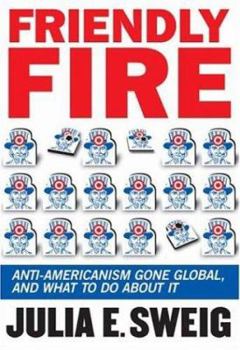Friendly Fire: Losing Friends and Making Enemies in the Anti-American Century
Select Format
Select Condition 
Book Overview
In 1945 the U.S. was the founding impulse behind the cornerstones of the International Community: the World Bank, International Monetary Fund and most of all the United Nations. Untainted by colonialism or fascism, heroic in warfare and idealistic at home, the U.S. presented itself as a paragon to inspire a less noble and divided world. Sixty years later, that perception had been almost completely reversed. America had, in fact, quietly sowed the seeds of its own decline in the eyes of the world in its own back yard. Anti-Americanism, now a global phenomenon, was road tested in South America when most of the rest of the world was too distracted to notice or care. There, under the guise of anti-communism, we sponsored dictatorships, turned a blind eye to killing squads and tolerated the subversion of democracy. Almost nobody knew, so it didn't matter, right? Wrong. On two counts. First, South America remembered. And second, encouraged by our success, we convinced ourselves that pre-emptive Americanism was a policy that could be shipped worldwide. This proved to be a big misjudgment. The world noticed and, helped by better scrutiny and faster technology, anti-Americanism flourished among America's closest allies beyond the Americas in a way and to a depth not seen before. As this reaches a crucial tipping point, Julia Sweig offers a brilliant and blistering history of what went wrong, and a feisty and compelling prescription for how to sort it out.
Format:Hardcover
Language:English
ISBN:1586483005
ISBN13:9781586483005
Release Date:April 2006
Publisher:PublicAffairs
Length:251 Pages
Weight:0.92 lbs.
Dimensions:0.9" x 6.7" x 8.4"
Customer Reviews
1 rating
Of all the recent critiques of U.S. foreign policy, this is the most constructive and cutting-edge
Published by Thriftbooks.com User , 18 years ago
Moderates and conservatives skeptical of the wartime proliferation of anti-U.S. treatises will find themselves falling unexpectedly in love with Julia Sweig's brilliant and provocative work, "Friendly Fire." This is the best nonfiction book I've read this year. Though the author is probably somewhere on the center-left, "Friendly Fire" is no knee-jerk, know-nothing, America-bashing critique. Sweig provides a trenchant and thoughtful analysis of other nations' growing antipathy to American foreign policy, completely without any ax to grind. Sweig's region-by-region analysis is practically a blueprint for how to get American foreign policy back on track while at the same time, keeping American interests in mind. Sweig offers the kind of proscriptive analysis too seldom found in the cheap, Michael Moore-style lefty critiques. She not only identifies the problems in U.S. foreign policy, she also offers solutions, including many that defy easy ideological categorization. As brilliant as this book is, Sweig's writing style is conversational and breezy - a sheer delight. "Friendly Fire" combines the intellectual heft of a Pulitzer Prize-winner with the easy-to-read narrative of a book that can remain atop the best seller list for a year. I loved this book.





